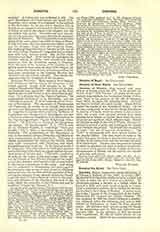

Donatus of Fiesole, Irish teacher and poet, Bishop of Fiesole about 829-876. In an ancient collection of the “Vitae Patrum”, of which an eleventh-century copy exists in the Laurentian library of Florence, there is an account of the life of Donatus, from which we glean the following facts. Donatus was born in Ireland, of a noble family. About 816 he visited the tombs of the Apostles in Rome. On his journey northwards he was led by Divine Providence to the city of Fiesole, which he entered at the moment when the people were grouped around their altars praying for a bishop to deliver them from the evils, temporal and spiritual, which afflicted them. Raised by popular acclaim to the See of Fiesole, Donatus instituted a revival of piety and learning in the Church over which he was placed. He himself did not disdain to teach “the art of metrical composition”. The “Life” is interspersed with short poems written by the saintly bishop. The best known of these is the twelve-line poem in which he describes the beauty and fertility of his native land, and the prowess and piety of its inhabitants. Donatus also composed an epitaph in which he alludes to his birth in Ireland, his years in the service of the princes of Italy (Lothair and Louis), his episcopate at Fiesole, and his activity as a teacher of grammar and poetry.
WILLIAM TURNER

